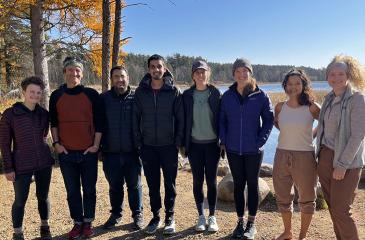This fall, the Center for Interprofessional Health and the Office of Academic Clinical Affairs brought a group of eight interprofessional learners to the Itasca Biological Station and Laboratories in north central Minnesota for the second rendition of the Itasca Ecohealth IPE Experience.
The intensive weekend-long collaborative learning retreat is designed to foster appreciation for ecohealth principles and geopolitical considerations in health. Learners explored unique cultures, values, roles and responsibilities, and expertise of other health professions and the impact these factors can have on health outcomes. They also analyzed interprofessional case studies and spent time in nature with a guide learning about the local ecosystem and the health benefits of spending time in nature.
Robert Pokorney, a nursing student who attended the experience, said, “The key takeaways for me are that we're never going to improve health care delivery by staying in our individual lanes. Each field has their own scope of practice, of course, but it's obvious that we have to collaborate. But to collaborate effectively, I think we need to devote time to making and maintaining relationships outside of our own fields. Another key takeaway is that it's always a good idea to go into the woods. Always.”
Medical student Chelsea Cornish agrees. “My biggest takeaway from the experience is that it is important to regularly immerse yourself in nature. I love being outdoors, hiking, camping, etc., but it's usually on a vacation and not a part of my typical routine.”
Located in Minnesota’s oldest state park, Itasca Biological Station and Laboratories is a University of Minnesota field station dedicated to research and teaching on how ecosystems work, with an eye to cultivating an appreciation of their value and preservation for future generations. In addition to exploring the park, participants also hiked in the park and walked to the nearby Mississippi River headwaters where they learned about the impact of the land on health and the environment.
Cornish said, “On our walk to the headwaters of the Mississippi, we discussed the positive effects of nature on the mind and body. It helped me to de-stress and gave me insight on how I can incorporate nature into my daily life.”
Justine Mishek, MHA, who served as the lead faculty on the experience, said, “As the weekend of learning and outdoor activities progressed, the benefits of interprofessionalism and going to nature unfolded before our eyes. We are confident students will carry the connections they made with one another and nature into their studies and careers."
Pokorney highly recommends other health sciences students take part in the Itasca Ecohealth IPE Experience. He said, “It was a great balance of informal discussion, outside time, and getting to know each other outside of the classroom and Zoom. So far, it has been the most meaningful IPE experience of my time at the U.”
Cornish added, “I was excited to discuss the intersection between health and the environment because I don't get the opportunity to do that much these days. I studied the subject in college, but medical school is busy and this trip provided a unique space to engage in these discussions. I would definitely recommend this experience!”
Participation in the Itasca Ecohealth IPE Experience serves as part of the 1Health interprofessional education curriculum. The program will be offered again in spring 2023.



